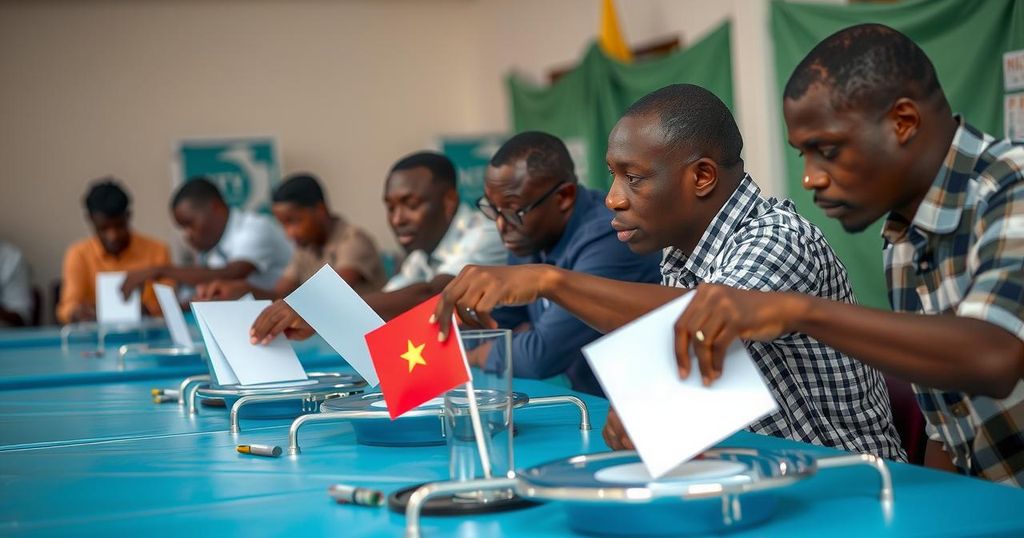World news
ACCRA, AFRICA, AKUFO - ADDO, BAWUMIA, DEMOCRACY, ELECTION, ELECTORAL PROCESS, GHANA, GOVERNANCE, GOVERNMENT, INTERIOR MINISTRY, JAMES NSIAH, JAMESTOWN, JOHN MAHAMA, MAHAMUDU BAWUMIA, NANA AKUFO - ADDO, NATIONAL DEMOCRATIC CONGRESS, NDC, NORTH AMERICA, NPP, OPPOSITION, UNITED STATES, WEST AFRICA
Aisha Khan
0 Comments
Ghana Holds Tense Presidential Elections Amid Economic Turmoil
Ghanaians participated in a closely contested presidential election, featuring Vice President Mahamudu Bawumia and former President John Mahama. The election is critical given Ghana’s economic struggles, marked by a debt default, inflation and ongoing IMF negotiations. With a focus on economic recovery, both candidates have proposed different strategies, reflecting a politically charged environment as voters seek change amid the current administration’s challenges.
On Saturday, Ghanaians voted in a tightly contested presidential election, pitting Vice President Mahamudu Bawumia against former President John Mahama. This election follows Ghana’s dire financial situation marked by significant economic challenges, including a debt default, inflation exceeding 50 percent, and ongoing negotiations for a $3 billion bailout from the International Monetary Fund (IMF). With President Nana Akufo-Addo concluding his second term next month, the elections carry heightened stakes as the nation seeks recovery.
The ruling New Patriotic Party (NPP) aims to secure an unprecedented third consecutive term, advocating under the slogan “Break the 8,” while Bawumia is attempting to distance himself from controversy regarding Akufo-Addo’s economic performance. Dressed in traditional garb, he expressed optimism about his campaign’s reception among voters.
In contrast, Mahama, who previously served from 2012 to 2017, aims to restore economic stability by proposing a “24-hour economy” to create jobs and renegotiate the IMF agreement. Voter sentiment appears mixed, with some expressing disillusionment towards the current administration’s policies while others remain wary of Mahama’s past performance.
The election is additionally complicated by environmental issues, including illegal gold mining, which has proliferated despite promised government interventions, affecting local waterways and cacao production, central to Ghana’s economy. As votes were cast until 1700 GMT, early returns are anticipated on Sunday, with full presidential results expected by Tuesday.
The current presidential election in Ghana is significant, as it occurs after the country experienced its worst financial crisis in recent memory, leading to a major debt default and negotiations with the IMF for a bailout. The economy, particularly in realms such as cocoa production and gold exports, has struggled under high inflation and a depreciated currency. Ghana’s political landscape is characterized by two main parties, the New Patriotic Party (NPP) and the National Democratic Congress (NDC), which have alternated in power since 1992. This election is notably contentious as it addresses pressing economic issues that the electorate is eager to resolve, making it a key moment in Ghana’s democratic process.
In conclusion, the presidential election in Ghana reflects a nation grappling with economic adversity, with both candidates offering distinct visions for recovery. As voters express a desire for change amid high inflation and job scarcity, the outcome of this election may signal a pivotal shift in Ghanaian governance and policy direction. With results expected imminently, the developments following this election will be closely scrutinized as they hold implications for the future trajectory of the nation.
Original Source: www.france24.com




Post Comment